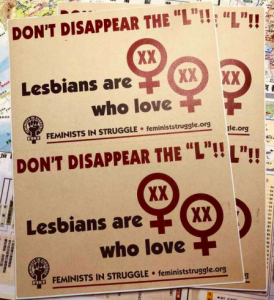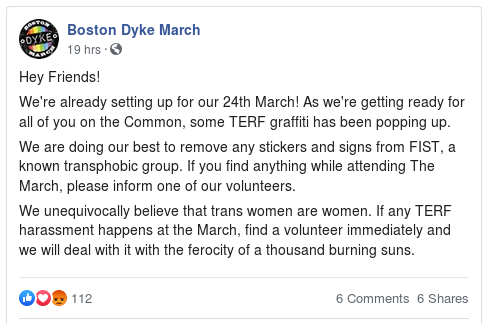This is an opinion piece submitted by two lesbian members of FIST and does not necessarily reflect the position of FIST as an organization.

We used to look forward to participating in Pride parades. In the days when they were called Lesbian/Gay Pride, they were political events with a feminist message. In 1977, 5,000 women marched at the head of the Pride March in San Francisco, right behind Dykes on Bikes. Lesbian-feminists spoke and sang from the podium. We needed Pride because our same sex love had been shrouded in shame – the silence and invisibility of the closet, something never demanded of heterosexuals. We were losing jobs, housing, and custody of our kids because we were openly gay or lesbian or because the sex of our partners had been discovered.
But Pride has changed. And we don’t mean the drag. Gender non-conformity including cross-dressing was always extremely common among lesbians and gay men, and was, from the beginning, pervasive at our Pride events. There were always drag queens on elaborate floats in attendance, and women in full butch regalia. But, until quite recently, the idea that cross-dressing and other behaviors that do not conform to sex stereotypes meant your sexed body was “wrong” and in need of medicalization, was exceedingly rare among gay men and almost non-existent among lesbians.
In addition, overt sexual displays such as BDSM did not exist at Pride events to any significant extent until the 1990’s. Lesbian, gays, bisexuals, and our straight supporters always brought their kids to Pride without hesitation. These were not X- rated events. Now they are.
To be blunt, Pride is no longer the event we remember. It has become thoroughly corporatized, pornified, and coopted, a shadow of its former self that was forged in the struggle for lesbian and gay rights. The extent of the merger that has occurred between Pride and corporate America is a bit shocking. For example, the list of sponsors of San Diego Pride is a virtual Who’s Who of corporate America. Sponsors include Bank of America, Starbucks, Northrup Gruman, Charles Schwab, Jack-in- the-Box, Coca-Cola, Greystar, San Diego Gas & Electric, and Chevrolet. There are also sponsors from the medical industrial complex, including Blue California, Kaiser Permanente, Genentech, and notably, Rady’s Children’s Hospital which works in the highly lucrative field of gender medicine, operating the Center for Gender Affirming Care for “children, adolescence and young adults.”
The community, too, has changed. The growing amalgam of lettered identities introduced heterosexuals into our community and has increasingly marginalized lesbians and gay men. Lesbians especially have been almost completely squeezed out of the community now dominated by the “TQ”. Women’s spaces and cultural events that nurtured and supported lesbians such as the Michigan Women’s Music Festival were labelled “trans-exclusionary” and are now gone; female-only lesbian groups and a lesbian same-sex sexual orientation itself have been redefined as “transphobic bigotry.” A misogynistic and homophobic sex-denying ideology has become dominant and is encouraging the medical transition and sterilization of mostly female teens – tomboys and future lesbians – into facsimiles of the other sex, at great cost to their long-term health.
Pride has also been torn from its roots. Our lesbian and gay history is being rewritten so that we have forgotten that in 1969 drag queens were gay men, rather than “trans”; that it was not transgender identified males but an African-American butch lesbian, Storme DeLarvarie https://en.wikipedia.org/wiki/Storm%C3%A9_DeLarverie who kicked off Stonewall; and that gays and lesbians, not trans identified individuals, organized the first Pride March. Please listen to the words of Fred Sargeant, who was there. https://openvault.wgbh.org/catalog/V_C9A3B5DB7A6848F7B5F9858C106C6854
So, has Pride outlived its usefulness? Despite the progress we have made since Stonewall, anti-lesbian/gay prejudice continues to run deep within the population. Witness that homophobia – both external and internalized – is one of the main forces propelling medical transition in both children and adults.
In the U.S., lesbians and gay men are still at risk. It was only in 2003 that the Supreme Court in a 6 to 3 decision invalidated sodomy laws in Lawrence v. Texas https://supreme.justia.com/cases/federal/us/539/558/while such laws criminalizing homosexuality between consenting adults remain on the books in Texas and 11 other states. https://en.wikipedia.org/wiki/Sodomy_laws_in_the_United_States#:~:text=As%20of%20May%202023%2C%2012,result%20of%20Lawrence%20v.%20Texas.
We are still not protected by federal laws explicitly prohibiting sexual orientation discrimination. Instead, we have one Supreme Court decision, Bostock v. Clayton County, https://www.supremecourt.gov/opinions/19pdf/17-1618_hfci.pdf that protects against employment discrimination based on sexual orientation under sex discrimination; and another, Obergefell v. Hodges, https://www.law.cornell.edu/supremecourt/text/14-556 that recognizes the right to marry a same sex partner. But we have seen how Supreme Court decisions can be quickly reversed as happened regarding the issue of abortion. Justice Thomas has recently called for revisiting both Lawrence and Obergefell. It would be foolish to let our guard down now.
Large sections of the world present an even more dangerous picture. Places like Iran and Uganda continue to criminalize same sex love, subjecting lesbians, and gay men to the death penalty.
Yes, we still need Pride, as a movement for lesbian/gay rights, not as a market share. Our liberation from anti-gay prejudice and compulsory heterosexuality has not yet been achieved.
One of the most persistent myths used against us is that we lesbians and gay men are “perverts” who “groom” and molest children to “recruit” to our “lifestyle”. Yes, as in all sectors of society, there are gay people, especially gay men, who think “love” between grown adults and minors is just fine. Pornography has permeated our community just as it has straight society. But the vast majority of our community, both men and women, have long ago and wholeheartedly rejected pedophilia and continues to do so, in part due to having been influenced by a feminist understanding of power and abuse. Moreover, the Catholic Church was far more of a hotbed of sexual abuse of children then the lesbian and gay community is or has ever been.
This reality did not prevent anti-gay right wing Christian fundamentalist forces from campaigning against lesbian/gay rights in the early years based on the risk lesbians and gay men supposedly pose to children. Witness in the late 1970’s the “Save Our Children” campaign of Anita Bryant to overturn local gay rights protections in Florida; and the California Briggs Initiative, one year later, ultimately defeated, that proposed to exclude gay teachers and anyone else in the schools that openly supported lesbian/gay rights.
These arguments seem to be resurfacing once again, from right wing anti-gay politicians like DeSantis who write overly broad bills and policies; and even from members of the our own community who, in fighting against child medical transition and indoctrination of children into gender identity ideology in schools, appear to agree that (open) gays and lesbians are a threat to children and should be kept away from them until they are 18 to avoid the adults being “groomers.” For example, Rainbow Rebellion and Gays Against Groomers are organizing a Pride counter-protest in St. Louis which proclaims, “LGBTQ+ Stay away from the kids.” https://www.trevoices.org/
But lesbian/gay parents and teachers do not threaten children’s safety nor do they “recruit.” Moreover, it should be o.k. to “say gay” in schools, to discuss and read books about same sex families and relationships or learn about lesbian/gay history. Gay, lesbian, and bisexual teens dating and exploring their same sex sexuality with their peers also deserve our support. The teaching of age-appropriate sex education in schools, including that related to homosexuality, is fine. Even being exposed to cross-dressing or drag is not in itself a risk to kids. Rather, pornified displays by adults whether by drag queens or by Beyonce, Lady Gaga or other similarly hyper-sexualized “straight” performers, are inappropriate for young children.
It is not gays and lesbians, nor, for that matter, individual adults that identify as transgender, that pose a risk to kids. We do not need to stay away from children. Rather, it is the teaching of gender identity ideology to children, whoever does the teaching – that a child may have been born in the “wrong” body which the doctor can “fix” for you, that “feminine” men and boys, and “masculine” women and girls are not really members of their sex, and that biological sex either doesn’t exist, or can be changed. chosen, or overridden by an amorphous feeling called “gender identity” that everyone is supposed to have- which causes children profound confusion and can unleash untold physical harm.
Lesbians and gays are not responsible for how our community has been hijacked. Let’s reject the shame and take-back Pride from our corporate masters. We can fight against child transition while remaining vigilant in defense of lesbian and gay rights and not giving an inch to homophobia. WE WILL NOT GO BACK.



